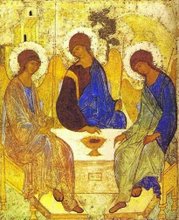Today I rediscovered a french show I used to watch when I came to Canada. This show helped me to keep my faith for sometime. And then I started College, very busy, I started forgetting about it until I lost appetite for it. I think at one point I became as busy as Martha. My view of serving God had changed. Mary's way is the contemplative way: prayer, meditation, and then work. But we can guess that Martha's way was the opposite. That's what happen when we neglet prayer. We become weak, in fact the 'contemplative' way become unattractive. Instead we think that there are things to get done first and then we will go to the Lord. But those things keeps increasing until we feel that we don't have time for prayer anymore. Actually all that time is feeled with our own worldly things that we excuse and tell ourselves that they are part of God's plan... But the fact is, when prayer is lost we loose strength in all spiritual things. We may even loose spiritual life at the end.
I was reading the first chapters of the "Dark Night" and I was surprised on how they relate to the Interior Castle, this story of Marth and Mary, and today gospel of prophet Jonah. Those chapters describe what happen when a soul is about to enter the dark night of a soul. It seems that a soul like Martha who really love the Lord can be mistaken in certain ways to a point when it realises that it has lost Him. But because it loves Him, it will not get lost. It will eventually find the way back and this time it will be more "purified of its imperfections" as St. John of the Cross explains.
The three nights in the big fish for Jonah can be considered a dark night. He got afraid of testifying, and the three nights made him stronger enough to do his job. They striped him not of the fear but of the reasons of his fear. His imperfections were removed. But we can undestand that this would not have happen if he had prayed enought to be above his fears. In one of the previous post I mentioned how St. Francis de Sales explains the necessity of prayer.
1. Prayer opens the understanding to the brightness of Divine Light, and the will to the warmth of Heavenly Love--nothing can so effectually purify the mind from its many ignorances, or the will from its perverse affections. It is as a healing water which causes the roots of our good desires to send forth fresh shoots, which washes away the soul's imperfections, and allays the thirst of passion.
2. But especially I commend earnest mental prayer to you, more particularly such as bears upon the Life and Passion of our Lord. If you contemplate Him frequently in meditation, your whole soul will be filled with Him, you will grow in His Likeness, and your actions will be moulded on His. He is the Light of the world; therefore in Him, by Him, and for Him we shall be enlightened and illuminated; He is the Tree of Life, beneath the shadow of which we must find rest;--He is the Living Fountain of Jacob's well, wherein we may wash away every stain. Children learn to speak by hearing their mother talk, and stammering forth their childish sounds in imitation; and so if we cleave to the Savior in meditation, listening to His words, watching His actions and intentions, we shall learn in time, through His Grace, to speak, act and will like Himself. Believe me, my child, there is no way to God save through this door. Just as the glass of a mirror would give no reflection save for the metal behind it, so neither could we here below contemplate the Godhead, were it not united to the Sacred Humanity of our Saviour, Whose Life and Death are the best, sweetest and most profitable subjects that we can possibly select for meditation. It is not without meaning that the Saviour calls Himself the Bread come down from Heaven;--just as we eat bread with all manner of other food, so we need to meditate and feed upon our Dear Lord in every prayer and action
The above comments point directly to Mary at the feet of Jesus. If we remember that Mary Magdalena was the one who was saved from being stoned to death we can see that she most likely undestood how to get healed. She undestood the importance of prayer better than Martha.
Those comments also point to the Interior Castle. St. Teresa says that 'prayer' is the door to this castle; meaning that we can't know ourselves unless we pray. Praying is connecting with Truth and Life (Jesus). Entering this castle is important because we really undestand what is going on around us. St Therese described it wonderfully that she shows that it is the building in which we live. The more we live in, the more our lives will be fulfilled. But she explains that the first rooms are filled with obstacle that prevent us from seing the Majesty of God inside. Only a big desire to know Truth can defeat those 'reptiles' as she calls them.
But if we stay outside our own house (our soul and live in confusions, etc) and we don't care to do something about it, we face the clear consequences. That's why Jesus responds:
“An evil and unfaithful generation seeks a sign,but no sign will be given it except the sign of Jonah the prophet. Just as Jonah was in the belly of the whale three days and three nights, so will the Son of Man be in the heart of the earththree days and three nights.
We will see the miracle of Jesus. We will undestand what it means. Because we will wish we can get out of the belly of the whale, and we will only get out throught the prayer in the name of the cruxified Jesus. God explains it to St. Catherina of Sienna in Treatise on Divine Providence:
"Do you not know, dear daughter, that all the sufferings, which the soul endures, or can endure, in this life, are insufficient to punish one smallest fault, because the offense, being done to Me, who am the Infinite Good, calls for an infinite satisfaction?
"However, I wish that you should know, that not all the pains that are given to men in this life are given as punishments, but as corrections, in order to chastise a son when he offends; though it is true that both the guilt and the penalty can be expiated by the desire of the soul, that is, by true contrition, not through the finite pain endured, but through the infinite desire; because God, who is infinite, wishes for infinite love and infinite grief.
"Infinite grief I wish from My creature in two ways: in one way, through her sorrow for her own sins, which she has committed against Me her Creator; in the other way, through her sorrow for the sins which she sees her neighbors commit against Me. Of such as these, inasmuch as they have infinite desire, that is, are joined to Me by an affection of love, and therefore grieve when they offend Me, or see Me offended, their every pain, whether spiritual or corporeal, from wherever it may come, receives infinite merit, and satisfies for a guilt which deserved an infinite penalty, although their works are finite and done in finite time; but, inasmuch as they possess the virtue of desire, and sustain their suffering with desire, and contrition, and infinite displeasure against their guilt, their pain is held worthy.
"Paul explained this when he said: If I had the tongues of angels, and if I knew the things of the future and gave my body to be burned, and have not love, it would be worth nothing to me. The glorious Apostle thus shows that finite works are not valid, either as punishment or recompense, without the condiment of the affection of love."
"I have shown you, dearest daughter, that the guilt is not punished in this finite time by any pain which is sustained purely as such. And I say, that the guilt is punished by the pain which is endured through the desire, love, and contrition of the heart; not by virtue of the pain, but by virtue of the desire of the soul; inasmuch as desire and every virtue is of value, and has life in itself, through Christ crucified, My only begotten Son, in so far as the soul has drawn her love from Him, and virtuously follows His virtues, that is, His Footprints.
"In this way, and in no other, are virtues of value, and in this way, pains satisfy for the fault, by the sweet and intimate love acquired in the knowledge of My goodness, and in the bitterness and contrition of heart acquired by knowledge of one's self and one's own thoughts. And this knowledge generates a hatred and displeasure against sin, and against the soul's own sensuality, through which, she deems herself worthy of pains and unworthy of reward."
Many fantastic movies have been produced trying to illustrate the drama of souls, but I wonder if no director or producer ever discoverd the Interior Castle to make something visual out of it. Something more illustrating and undestandable than Constantine or more true than the Lord of the Ring or the Matrix.




No comments:
Post a Comment